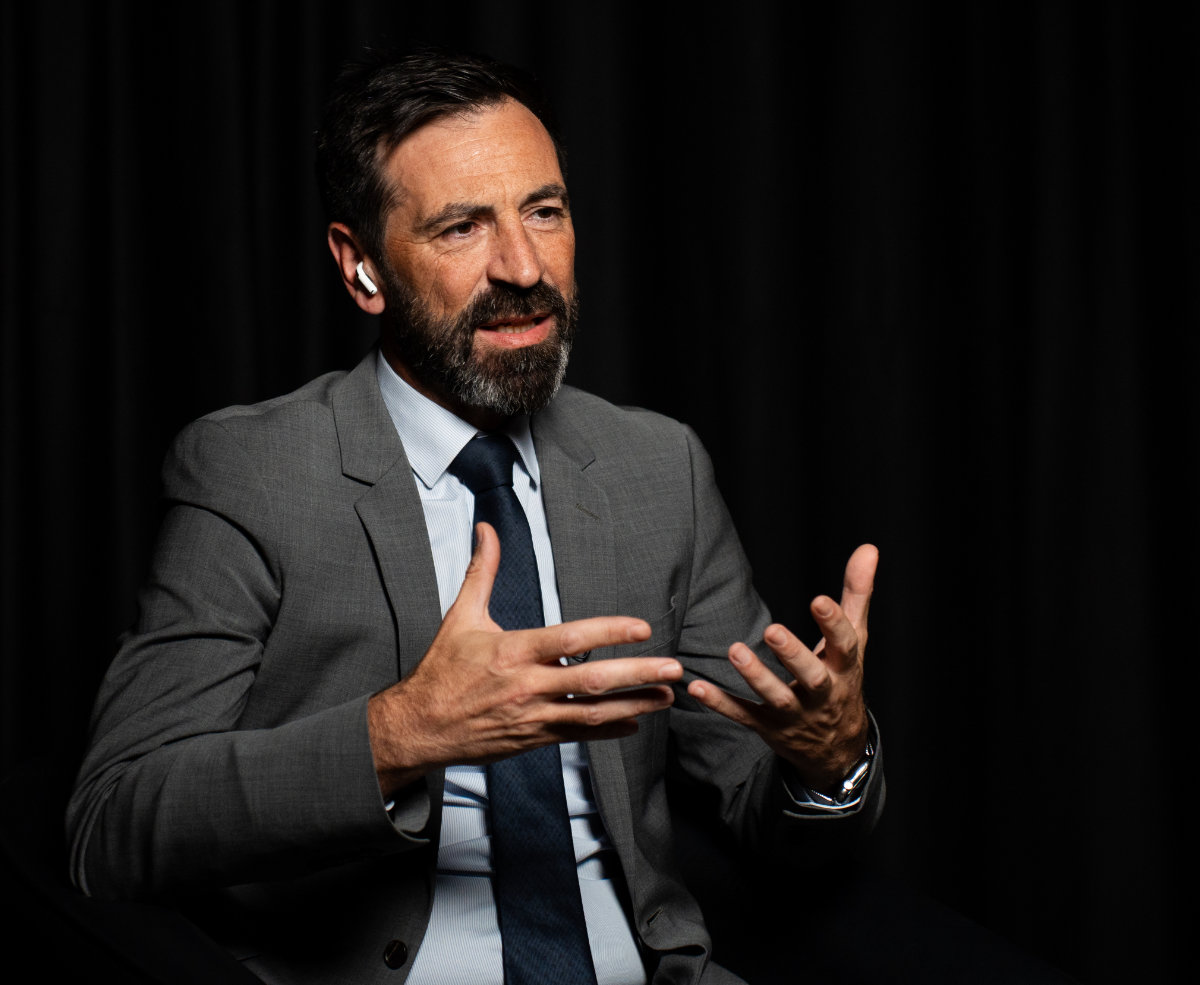DUBAI: On May 20, the International Criminal Court prosecutor Karim Khan applied to the court for arrest warrants to be issued against senior Hamas commanders and for Israel’s Prime Minister Benjamin Netanyahu and Defense Minister Yoav Gallant for war crimes and crimes against humanity.
The International Committee of the Red Cross, one of whose key functions is to call on all parties in a conflict to uphold international humanitarian law, is in favor of prosecutions in cases where individuals have violated the laws of armed conflict.
Fabrizio Carboni, the ICRC’s regional director for Near and Middle East, made the above point clear during an appearance on “Frankly Speaking,” the Arab News current affairs program.

Fabrizio Carboni, ICRC regional director for Near and Middle East, spoke to Frankly Speaking host Katie Jensen. (AN photo)
“Usually we don’t comment on judiciary matters, especially if they’re related to a conflict where we have a very strong presence and where our staff is present,” he said.
“As a matter of principle, as the ICRC, obviously we believe that the law of armed conflict makes sense if you prosecute the people who violate it.
“And so we obviously, beyond the conflict in Gaza, beyond any specific case, we support prosecution.”
He added: “We support national prosecution first, and then international one if the national prosecution doesn’t comply. Now in this case of the ICC, our position is not to comment. We observe.”
In the wide-ranging interview, Carboni expressed anger at the trauma being experienced by Palestinian ICRC staff in Gaza, and explained among other things the impact of the Gaza war on other regional conflicts and the ICRC’s ongoing role in resolving them.

Palestinian Red Crescent personnel check an ambulance destroyed during Israeli strike in Deir al-Balah, central Gaza Strip, on January 10, 2024. Four medics and two other people were reported killed inside the vehicle. (AFP/File)
No matter how big the imbalance of strength between Israel and Hamas, the international humanitarian law applies to both sides, Carboni he told Katie Jensen, the host of “Frankly Speaking.”
“There is no hierarchy in this. Parties to a conflict, state or non-state armed group, have obligations. And when we think about this humanitarian obligation, it’s basic. It’s the minimum.
“These are not very complex and sophisticated rules — just asking for the civilian population to be spared, just asking for civilians when they are displaced to receive basic assistance, to have access to essential services. It’s really basic humanity.”
Hamas broke international humanitarian law on Oct. 7 when its fighters kidnapped and killed civilians in southern Israel. Since then, Israel has been facing the bulk of the same accusation.

The relatives of Naor Hassisim, a victim of the Oct. 7, 2023, Kibbutz Kfar Aza attack by Hamas militants, grieve over his body during his funeral at a cemetery, in the southern Israeli city of Ashdod on October 16, 2023. (AFP/File)
Despite the best efforts of the ICRC to compel Israel and Hamas to abide by the rules of war, it suspects both sides are still violating them. Carboni put this down to what he calls “survival narrative.”
“Something we don’t often mention is emotions and the fact that all parties in this conflict have a narrative of survival,” he said.
“I’m not commenting. I’m not saying it’s right or wrong. I’m just seeing this. And when I engage all parties to this conflict, there is a survival narrative.”
In November last year, Israel and Hamas agreed to a humanitarian pause in the fighting, which permitted an exchange of prisoners and hostages and allowed aid agencies to get urgently needed supplies into Gaza to help civilians.

In this combination image, a convoy of Red Cross vehicles carrying Israelis taken hostage (left frame) by Hamas militants arrive at the Rafah crossing in the southern Gaza Strip on November 30, 2023, as part of a prisoner swap with Palestinian prisoners. On the right frame shows a Red Cross bus and delegation arriving outside the Israeli Ofer military prison near Ramallah to fetch Palestinian prisoners covered by the deal. (AFP photos)
Fighting soon resumed, however, and attempts by interlocutors since at securing a permanent ceasefire have failed.
If given the opportunity of another humanitarian pause, Carboni is confident the ICRC can make a significant difference to the lives of Palestinians trapped in Gaza and the hostages still held by Hamas.
“We could make a difference for the Palestinian people, because you might have assistance increase significantly during this pause,” he said. “We could have access to many areas safely and assist more Palestinian people.
“At the very same time, we could get hostages released. We could get detainees on the Palestinian side released by Israel. And this represents a form of hope.”
Part of the ICRC’s remit is to intercede in hostage negotiations. Carboni said the families of the hostages still held in Gaza are in a “permanent state of torture.” “Unfortunately, we know very little about the fate of the people who were taken hostage,” he said.

A child looks on as a Palestinian woman holds the shrouded body of a baby killed in Israeli bombardment at a health clinic in Rafah on May 26, 2024. (AFP)
“It’s part of this political, military environment where you negotiate everything, even things which shouldn’t be negotiated, such as the release of hostages, because (the taking) of hostages is totally prohibited.
“You can only imagine the condition of the hostages. You imagine the fighting, you imagine the bombing, you see the situation in Gaza, and you can imagine what the hostages are going through.
“And also a word on the families. When you’re a member of a family of a hostage or just a person missing, you don’t know, is he alive, is she alive, dead or not? Is she in good health, not in good health? And this situation for the families is a permanent state of torture.
“And I really feel this pain with the families of the hostages. Any family, being Palestinian or Israeli, who doesn’t know where his or her loved one is. And that’s why, as ICRC, we try to push as much as we can to find an answer, to release the hostages now.”
Carboni revealed that a couple of weeks ago, there was hope during two or three days for a ceasefire and release of hostages. “We really thought, a lot of people thought, that we would get there,” he said.
“And then suddenly it all collapsed. And I can tell you that the psychological impact of this failure on the civilian population in Gaza, on the families of the hostages, is devastating.”

People demonstrate in Tel Aviv on November 9, 2023, calling upon the International Committee of the Red Cross to take action for the release of hostages abducted by Palestinian militants on October 7. (AFP)
Meanwhile, according to him, humanitarians are running out of words to describe the misery that the Palestinian people are enduring in Gaza under Israel’s offensive. He underscored the urgency of de-escalation in Gaza, where Israel has been fighting the Palestinian militant group Hamas since Oct. 7 last year.
“There is an urgent need to de-escalate the level of violence,” he said. “What we see today in Gaza is unbearable.
“The civilian population, the Palestinian population, is going through a round of misery, which I have difficulty to even describe, because after seven months, eight months, I have the impression we used pretty much all the possible words to describe what they’re going through.
“I’m really concerned, because we don’t have words anymore. I’m afraid that at one stage, the situation of the Palestinian people in Gaza and including the hostages won’t be news anymore, because we are turning in circles, because we don’t see an improvement, because we see no end to this misery.”
Carboni added: “Every time I think about Gaza, I’m thinking about my Palestinian colleagues who are trapped in Gaza. “I’m thinking about their children, I’m thinking about their family, I’m thinking about the fact that they’ve been moved again.
“Most of them were coming from Gaza City. Then they moved to Khan Younis. Then they moved to Rafah. Now they are moving again. And I’m thinking about them.
“I’m thinking about, on the one hand, their courage, and on the other hand, this feeling of not being able to help them, not being able to alleviate their distress, their anxiety, their frustration.
“As a father, as a parent, I also connect with my colleagues who have children. It’s now, what, six, seven months that those children are living on a battlefield? Because Gaza is a very special situation. You’re permanently on the battlefield.
“You have children who, every day, are hearing bombs. Who’ve seen people being killed, wounded, children seeing their parents helpless.
“So, when I think about Gaza, I think about ICRC’s Palestinian staff, and it gives me the energy, humbles me, and at the same time makes me angry, because I don’t think my colleagues need to go through this.”

Palestinians inspect the destruction following overnight Israeli strikes on Rafah in the southern Gaza Strip on May 6, 2024, amid the ongoing conflict between Israel and Hamas. (AFP)3
Asked whether he thought the worst is now over or if there was still potential for a wider regional conflagration emanating from Gaza, Carboni said the spillover has already occurred, raising fears of an unintended escalation.
“It’s not that we have to fear a regional conflict happening — it’s happening while we’re talking,” he said. “We have the fighting in Lebanon. We had this night where we had missiles and drones launched from Iran on Israel. The regional conflict is happening.”
Beyond its role as a humanitarian aid agency, Carboni said ICRC plays a critical role in conflict resolution, in the hope that “diplomacy will prevail, politics will prevail, and not the use of force.”
However, the violence in Gaza has had a detrimental effect on conflicts elsewhere in the region, including in Yemen, where the Iran-backed Houthi militia has been locked in battle with the UN-recognized Yemeni government since 2014.
Since the outbreak of fighting in Gaza, the Houthi militia has mounted attacks on commercial shipping in the Red Sea and Gulf of Aden, ostensibly in solidarity with Palestinians, prompting retaliatory strikes by the US and UK.
As a result, the ceasefire between the Houthis and the Yemeni government, which expired in October 2022 but has remained largely intact, has been cast into doubt. Carboni said a prisoner exchange deal could get the stalled process back on track.
“The crisis in Gaza shook all the conflicts in the region,” he said. “I see the authorities in Riyadh trying to nevertheless push for this permanent ceasefire and tomorrow a peace agreement. One of the measures which would facilitate, which would build confidence, is to continue the release of detainees.”





























